Get DCD Account Details
1. getDCDAccountDetails.cs
We will first import these four packages as they are required to run the solution.

Step 1. Create class file to store content of the web response.
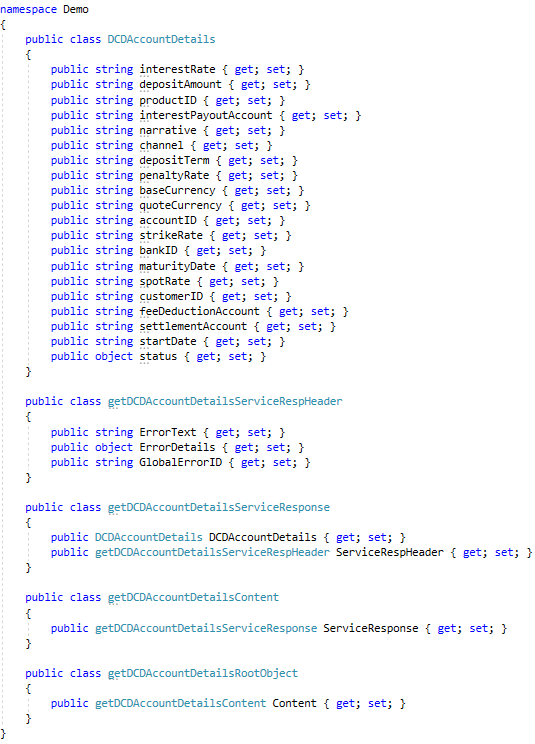
2. GetDCDAccountDetails.aspx.cs
We will first import these 15 packages as they are required to run the solution.
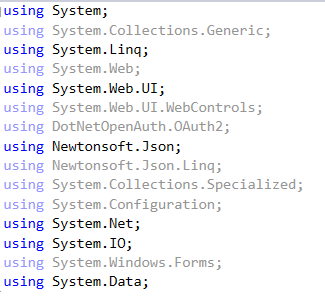
Code in Common
Step 1. We would first have to check if the user id and password are already stored inside the session. If the user id and password are stored, the solution will automatically populate into the user id and pin textbox. This is to provide convenience for the users as they do not need to manually type their user id and password repeatedly. Else, if the user id and password are not stored yet, we would then store them inside the session.
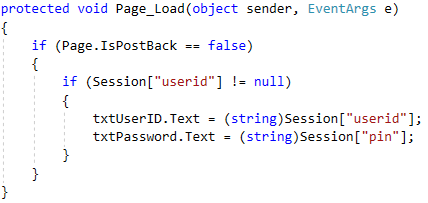
Step 2. The next step would be to store the details entered by the user. If the user id, password, and OTP already exist in session, users would not need to enter them again (refer to common stuff).
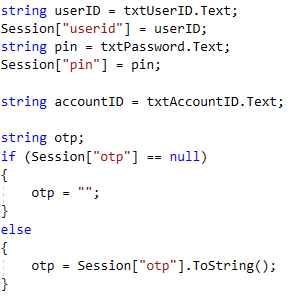
Step 3. Create the URL which would be posted to the server. User inputs need to be stored in the class created, and serialize into JSON format. In this function, both the header and content are needed.
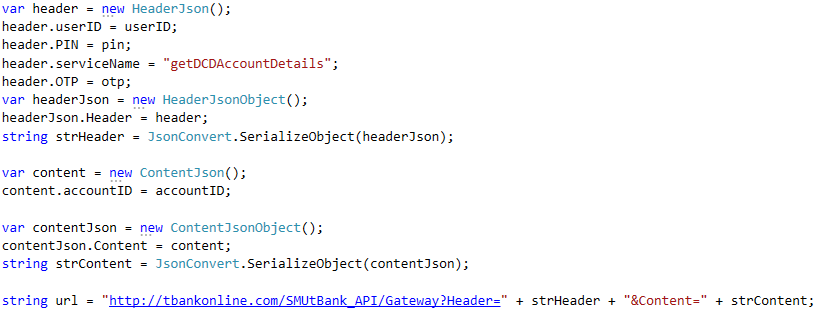
Step 4. After creating the URL, we would post the URL to the server, and store response. The URL is being sent using a web request function, and a response will be send back from the server. The response need to be deserialized first into the ‘getDCDAccountDetails’ class.

Step 5. Next step would be to obtain the error code. If error code is ‘010000’ which means invocation successful, the solution would populate the attributes of the ‘getDCDAccountDetails’ class into the label(s). If error code is '010041', it means that the OTP has expired, and we will use the newOTP() function to prompt the user for their OTP again. Else, we will display the ErrorText and ErrorDetails.
The newOTP() function can be referred to under Common Stuff Section
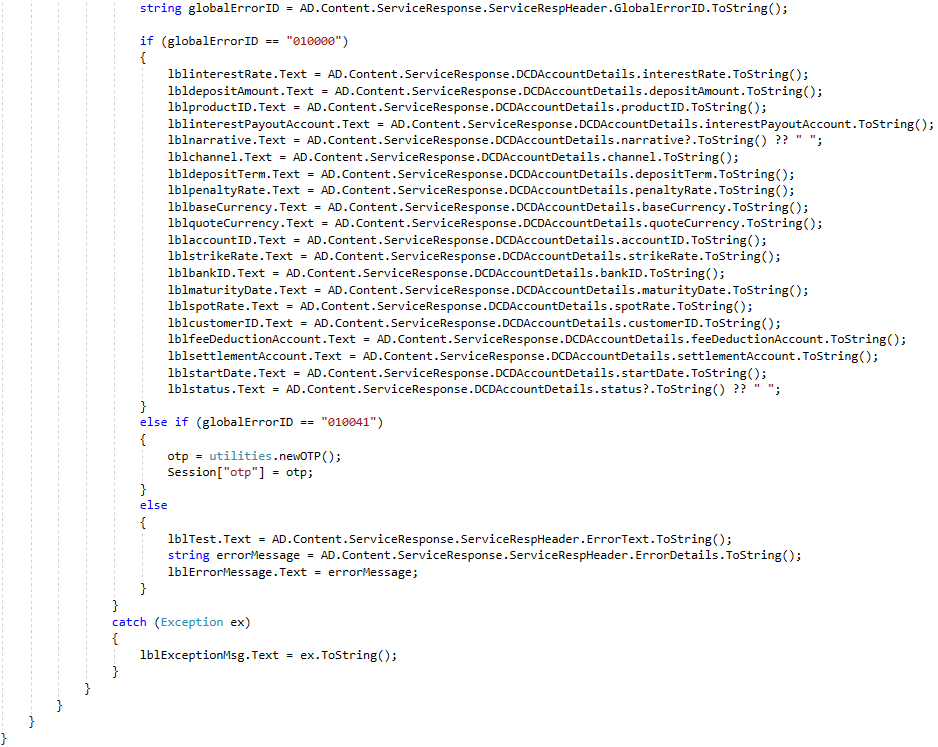
Overview of getDCDAccountDetails.cs
using System;
using System.Collections.Generic;
using System.Linq;
using System.Web;
namespace Demo
{
public class DCDAccountDetails
{
public string interestRate { get; set; }
public string depositAmount { get; set; }
public string productID { get; set; }
public string interestPayoutAccount { get; set; }
public string narrative { get; set; }
public string channel { get; set; }
public string depositTerm { get; set; }
public string penaltyRate { get; set; }
public string baseCurrency { get; set; }
public string quoteCurrency { get; set; }
public string accountID { get; set; }
public string strikeRate { get; set; }
public string bankID { get; set; }
public string maturityDate { get; set; }
public string spotRate { get; set; }
public string customerID { get; set; }
public string feeDeductionAccount { get; set; }
public string settlementAccount { get; set; }
public string startDate { get; set; }
public object status { get; set; }
}
public class getDCDAccountDetailsServiceRespHeader
{
public string ErrorText { get; set; }
public object ErrorDetails { get; set; }
public string GlobalErrorID { get; set; }
}
public class getDCDAccountDetailsServiceResponse
{
public DCDAccountDetails DCDAccountDetails { get; set; }
public getDCDAccountDetailsServiceRespHeader ServiceRespHeader { get; set; }
}
public class getDCDAccountDetailsContent
{
public getDCDAccountDetailsServiceResponse ServiceResponse { get; set; }
}
public class getDCDAccountDetailsRootObject
{
public getDCDAccountDetailsContent Content { get; set; }
}
}
Overview of GetDCDAccountDetails.aspx.cs
using System;
using System.Collections.Generic;
using System.Linq;
using System.Web;
using System.Web.UI;
using System.Web.UI.WebControls;
using DotNetOpenAuth.OAuth2;
using Newtonsoft.Json;
using Newtonsoft.Json.Linq;
using System.Collections.Specialized;
using System.Configuration;
using System.Net;
using System.IO;
using System.Windows.Forms;
using System.Data;
namespace Demo
{
public partial class GetDCDAccountDetails : System.Web.UI.Page
{
protected void Page_Load(object sender, EventArgs e)
{
if (Page.IsPostBack == false)
{
if (Session["userid"] != null)
{
txtUserID.Text = (string)Session["userid"];
txtPassword.Text = (string)Session["pin"];
}
}
}
protected void btnSend_Click(object sender, EventArgs e)
{
if (Page.IsValid)
{
try
{
string userID = txtUserID.Text;
Session["userid"] = userID;
string pin = txtPassword.Text;
Session["pin"] = pin;
string accountID = txtAccountID.Text;
string otp;
if (Session["otp"] == null)
{
otp = "";
}
else
{
otp = Session["otp"].ToString();
}
var header = new HeaderJson();
header.userID = userID;
header.PIN = pin;
header.serviceName = "getDCDAccountDetails";
header.OTP = otp;
var headerJson = new HeaderJsonObject();
headerJson.Header = header;
string strHeader = JsonConvert.SerializeObject(headerJson);
var content = new ContentJson();
content.accountID = accountID;
var contentJson = new ContentJsonObject();
contentJson.Content = content;
string strContent = JsonConvert.SerializeObject(contentJson);
string url = "http://tbankonline.com/SMUtBank_API/Gateway?Header=" + strHeader + "&Content=" + strContent;
var webRequest = (HttpWebRequest)WebRequest.Create(url);
webRequest.ContentType = "application/json";
webRequest.Method = "POST";
var result = "";
var httpResponse = (HttpWebResponse)webRequest.GetResponse();
using (var streamReader = new StreamReader(httpResponse.GetResponseStream()))
{
result = streamReader.ReadToEnd();
}
getDCDAccountDetailsRootObject AD = new getDCDAccountDetailsRootObject();
AD = JsonConvert.DeserializeObject<getDCDAccountDetailsRootObject>(result);
string globalErrorID = AD.Content.ServiceResponse.ServiceRespHeader.GlobalErrorID.ToString();
if (globalErrorID == "010000")
{
lblinterestRate.Text = AD.Content.ServiceResponse.DCDAccountDetails.interestRate.ToString();
lbldepositAmount.Text = AD.Content.ServiceResponse.DCDAccountDetails.depositAmount.ToString();
lblproductID.Text = AD.Content.ServiceResponse.DCDAccountDetails.productID.ToString();
lblinterestPayoutAccount.Text = AD.Content.ServiceResponse.DCDAccountDetails.interestPayoutAccount.ToString();
lblnarrative.Text = AD.Content.ServiceResponse.DCDAccountDetails.narrative?.ToString() ?? " ";
lblchannel.Text = AD.Content.ServiceResponse.DCDAccountDetails.channel.ToString();
lbldepositTerm.Text = AD.Content.ServiceResponse.DCDAccountDetails.depositTerm.ToString();
lblpenaltyRate.Text = AD.Content.ServiceResponse.DCDAccountDetails.penaltyRate.ToString();
lblbaseCurrency.Text = AD.Content.ServiceResponse.DCDAccountDetails.baseCurrency.ToString();
lblquoteCurrency.Text = AD.Content.ServiceResponse.DCDAccountDetails.quoteCurrency.ToString();
lblaccountID.Text = AD.Content.ServiceResponse.DCDAccountDetails.accountID.ToString();
lblstrikeRate.Text = AD.Content.ServiceResponse.DCDAccountDetails.strikeRate.ToString();
lblbankID.Text = AD.Content.ServiceResponse.DCDAccountDetails.bankID.ToString();
lblmaturityDate.Text = AD.Content.ServiceResponse.DCDAccountDetails.maturityDate.ToString();
lblspotRate.Text = AD.Content.ServiceResponse.DCDAccountDetails.spotRate.ToString();
lblcustomerID.Text = AD.Content.ServiceResponse.DCDAccountDetails.customerID.ToString();
lblfeeDeductionAccount.Text = AD.Content.ServiceResponse.DCDAccountDetails.feeDeductionAccount.ToString();
lblsettlementAccount.Text = AD.Content.ServiceResponse.DCDAccountDetails.settlementAccount.ToString();
lblstartDate.Text = AD.Content.ServiceResponse.DCDAccountDetails.startDate.ToString();
lblstatus.Text = AD.Content.ServiceResponse.DCDAccountDetails.status?.ToString() ?? " ";
}
else if (globalErrorID == "010041")
{
otp = utilities.newOTP();
Session["otp"] = otp;
}
else
{
lblTest.Text = AD.Content.ServiceResponse.ServiceRespHeader.ErrorText.ToString();
string errorMessage = AD.Content.ServiceResponse.ServiceRespHeader.ErrorDetails.ToString();
lblErrorMessage.Text = errorMessage;
}
}
catch (Exception ex)
{
lblExceptionMsg.Text = ex.ToString();
}
}
}
}
}
Created with the Personal Edition of HelpNDoc: Free HTML Help documentation generator